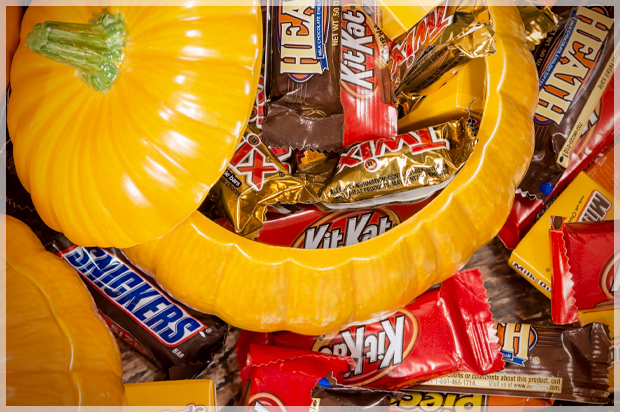On Saturday, before America’s so-called adults dress up in baffling sexy Elmo costumes and lighthearted racist stereotypes, the children of the land will be will be decking themselves out as Disney princesses and Marvel superheroes (BTW, thanks, patriarchy!) and doing what they wait all year long to do: Go around the neighborhood shaking people down for candy. For some families, though, the annual tradition is fraught with tension grounded in their children’s food allergies or the parents’ personal beliefs on what their kids should eat. But how much responsibility should those of us doling out fun-sized treats take for other people’s restrictions?
In New Britain, Connecticut, this week, residents were surprised to find bright orange flyers posted on telephone poles alerting neighbors, “Attention parents: My son has severe allergies and comes home every year devastated that he can’t eat any candy he’s collected at your homes while trick-or-treating. Don’t exclude my child or any other child from the fun.” It calls for “responsible parenting” and asks parents not hand out “candy containing nuts of any kind, gluten or dairy” — suggesting instead “tasty and allergy-conscience [sic] suggestions” like “carrot sticks; Necco Wafers, Smarties, Life Savers and Brach’s Lemon Drops candy; and raisins but stay away from Raisinettes!” [sic] To which many of us reply: Carrot sticks, LOLOLOLOL.
NBC Connecticut reported on the fliers, which were put up anonymously, earlier this week. Of course, Halloween is a time for tricks, and this message could just be a bit of holiday trolling. I mean, seriously, Necco Wafers? This has to be a joke. But some neighbors are taking the sign at its word. Resident Jennifer Dreher told NBC, “I think it’s a good idea. It’s nice that whoever that family is that they’re kind of making the neighborhood aware of their son’s allergies.” Another neighbor said, “My wife would probably like to give out something wholesome and nutritious,” though he added, “but certainly not a vegetable.” And a source from Connecticut Children’s Medical Center added enterprising revelers can distribute inedible items “including pencils, stickers or little cars,” but noting that it’s still up to each child’s parents to check on what’s in the trick-or-treat bag.
Concerns around food allergies have become an increasing issue for parents over the past several years, with schools and camps going nut-free and working hard to accommodate the varying sensitivities and restrictions of the children they serve. And if you’ve hosted a kid’s birthday party in the last decade, you’ve likely faced a deluge of special requests. (I can make an amazing vegan chocolate cake, if you’re interested.) Last year, Food Allergy Research & Education launched what it calls the Teal Pumpkin Project, to raise awareness of the issues that allergic trick or treaters face. Families are encouraged to place teal pumpkins on their doorsteps to “support children with food allergies” and announce that they have “non-food treats” for them. A map of families who’ve already pledged to have a teal Halloween currently has nearly 7,500 entries.
As parents, it’s our job to protect our kids and to also be sensitive to the needs of their friends and classmates. But it isn’t our job to parent those kids. What we control is our behavior, and if we choose to hand out toothbrushes or pencils (actual things you will find in trick or treat bags) or cool toys or fliers condemning the practices of Nestle (also actual things my own children have received in years past), that’s for us to choose. And as Care.com suggests, we can also find creative ways to let our kids participate in Halloween traditions even if — for whatever reason — they can’t partake in all the loot from it. But what is not okay is policing the behavior of other, more candy-friendly homes. And no one should get in the way of a parent’s right to decide what to give out on Halloween — or how many of their children’s Reese’s Peanut Cups they can sneak for themselves later.

